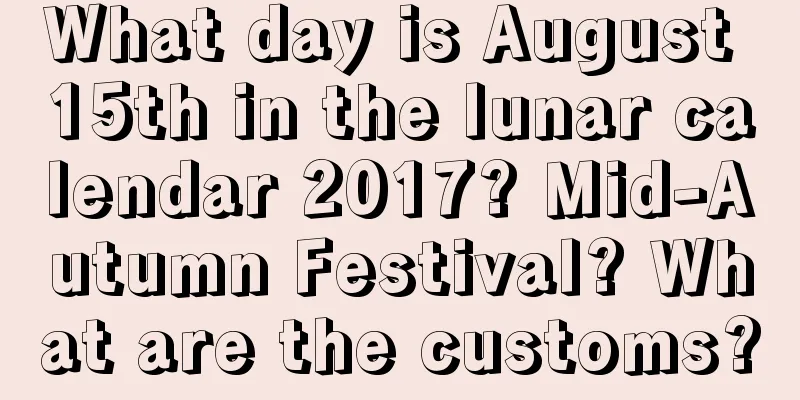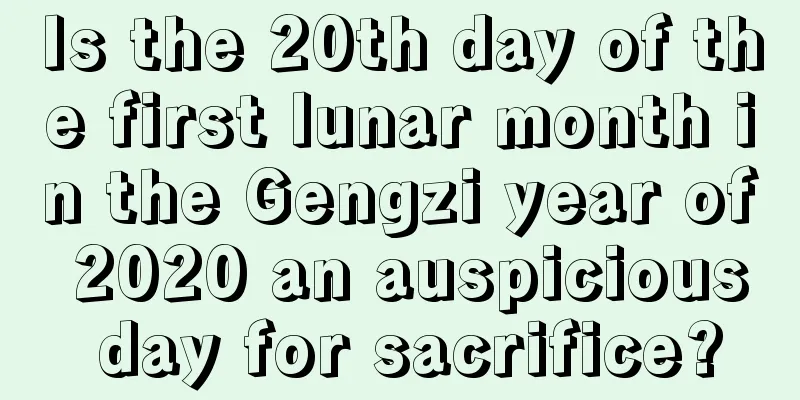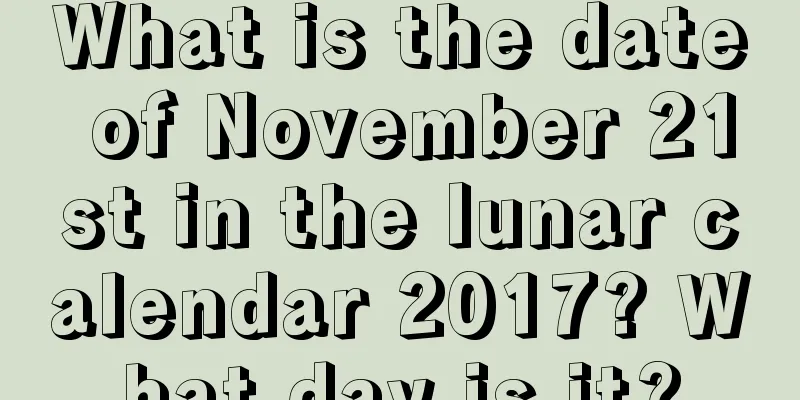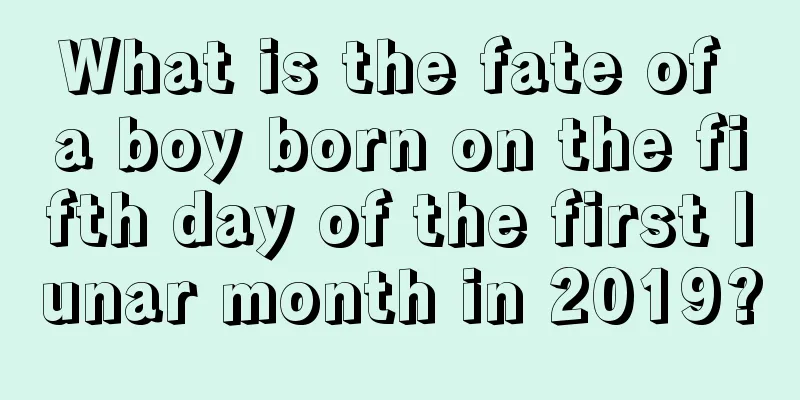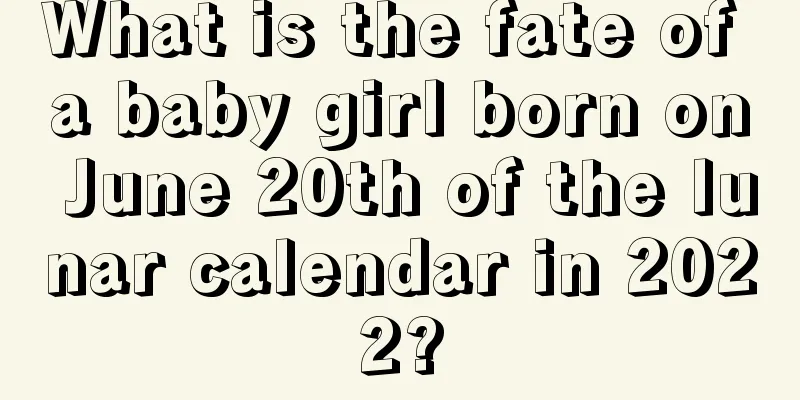Can I travel during Qingming Festival? What are the taboos for traveling during Qingming Festival?
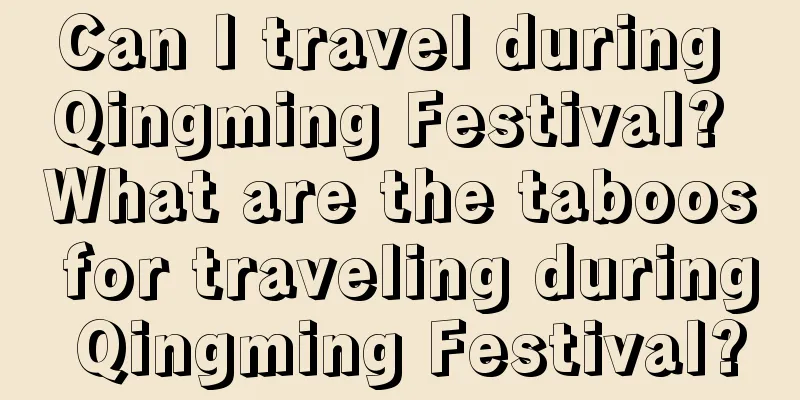
Introduction: The origin of Qingming Festival is a long history. Qingming Festival is a traditional festival in my country and one of the most important festivals for worshiping ancestors. It is a day for worshiping ancestors and sweeping tombs. So, can we travel during Qingming Festival? What are the taboos for traveling during Qingming Festival? Let’s explore it together! March is the last month of spring, when all things will revive and begin a beautiful growth process. The third month of the lunar calendar is a time full of vitality because it is the most beautiful.Brief introduction to Qingming FestivalQingming is an ordinary seasonal festival among the 24 solar terms. According to "Collected Explanations of the 72 Solar Terms in the Lunar Calendar", during this solar term, all things come back to life and it is a suitable time for farming. From then on, the busy stage of farming begins.Qingming Festival has a history of more than 2,500 years. Initially, there was no custom of ancestor worship on Qingming Festival, but later it gradually merged with the Cold Food Festival, which was only one or two days away, and developed into an important traditional festival in China. The Cold Food Festival was originally a day when fire was forbidden in ancient times. Later, it was associated with the legend that Duke Wen of Jin mourned his benefactor Jie Zitui, and tomb sweeping on the Cold Food Festival became a common social behavior. After the fusion of the two folk festivals, Qingming Festival and Cold Food Festival, the custom of banning smoking and eating cold food has gradually faded, while the custom of worshiping ancestors has become more prominent. Since my country's history originated from agricultural civilization, farming techniques, family business, clan relationships, etc. all emphasize inheritance from generation to generation. Therefore, for more than 2,000 years, Qingming Festival has become a unique custom that the Chinese people have passed down to remember their ancestors. In my country, in addition to the Han nationality, there are some ethnic minorities that also have the custom of celebrating the Qingming Festival, such as the Manchu, Hezhe, Daur, Oroqen, Ewenki, and Xibe in northern my country; and the Zhuang, Dong, Yi, Bai, She, Miao, Yao, Li, Shui, Jing, Qiang, Tujia, Naxi, Buyi, Pumi and other 25 ethnic groups in total all celebrate the Qingming Festival, but the festival customs are not exactly the same. What are the taboos for traveling during Qingming Festival?1. People with bad luck should not visit mountains or travel far away during the Qingming Festival because it has heavy Yin energy which makes the energy of the whole month dark and chaotic. Since ancient times, happy events such as weddings will not be arranged in this month for fear of conflicting Yin evil. Therefore, some friends who are unlucky are not suitable to visit graves or travel during the Qingming Festival, especially for long-distance travel. Instead, they can walk around crowded and prosperous places nearby to borrow other people's good energy to drive away their bad luck.2. People with heavy official and killing stars and weak body should not visit mountains or travel far away. In numerology, official and killing stars are the gods that restrain the body. If the innate fate is weak and the official and killing stars are heavy, and there are no seal stars and food and injury stars to reconcile them, people will feel stressed, lack of energy, easily tired, and often encounter gloomy things. As we analyzed above, during the Qingming Festival, the five elements are mainly dominated by earth, and among the five elements, earth controls water. Therefore, those who have Ren or Gui water as their day master in their eight-character numerology and are weak are not suitable for visiting mountains or traveling during the Qingming holiday (the heavenly stem of the day column in the eight-character numerology represents the day master. Those who are not sure can check on which day they were born in the Yiqi eight-character software). 3. People whose zodiac signs are in conflict with the lucky star should not visit mountains or travel far away. In our daily lives, when we move, get married, or open a store, we will not choose a day that conflicts with the owner of the destiny, because those who are in conflict are likely to leave. In fact, the same is true for visiting mountains and worshiping ancestors. In the past, it was called the conflicting zodiac sign that needs to be avoided. This conflict is mainly for fear of colliding with the aura of the living and causing their fortune to decline. April 2nd is Bingwu Day, which clashes with Rat, and Rat clashes with Tai Sui; April 3rd is Dingwei and Jiawu Day, which clashes with Ox, and Ox clashes with the lunar month; April 4th is Wushen Day, which clashes with Tiger. Friends of these three zodiac signs are not suitable for worshiping ancestors, but they can choose to travel far away, but do not choose places with obvious graves. Summary: After reading the introduction in the above article, we know that we can travel during the Qingming Festival, but we need to pay attention to some taboos. You can refer to the content of this article. I hope this article can help you! |
>>: When is Qingming Festival in 2017? How many days are left?
Recommend
Is it auspicious to move on New Year’s Day 2019? When is the auspicious time to move on New Year's Day?
Is it auspicious to move on New Year’s Day 2019? W...
Is it good to be born in the Year of Horse on New Year’s Day? Zodiac Horse Fate Analysis
The fortune of people born in the Year of the Hors...
Analysis of the fate of girls born on the 11th day of the 11th lunar month in 2018
What is the fate of a girl born on November 11, 20...
What is the zodiac sign of a child born on June 23rd of the lunar calendar in 2022? Cancer?
Speaking of zodiac signs, I believe everyone is fa...
Is it good for a girl to be born on June 25th of the lunar calendar in 2021? Girl's fate analysis
A lot of babies are born every day, and the fate o...
Is the eighth day of the sixth lunar month in 2018 suitable for traveling? What are the solutions to fatigue while traveling?
Introduction: Nowadays, it is popular among many p...
What is the fate of a man born on May 1st? Is he destined to be successful in his career?
Traditional numerology believes that babies born a...
Is the ninth day of the twelfth lunar month a good day in 2021? What does the three hous of the Great Cold mean?
Introduction: Every day unfolds differently. So, i...
What day of the week is November 13th in the lunar calendar 2020?
What day of the week is November 13th in the luna...
What is the zodiac sign of a child born on March 18th of the lunar calendar in 2019?
What is the zodiac sign of a child born on March 1...
What nicknames can be chosen for boys in June 2018? What are the methods for choosing nicknames?
A name will accompany a person throughout his life...
Detailed lunar calendar for July 25, 2019, and comparison between Gregorian and lunar calendars
Every day has a corresponding lunar calendar and ...
Is the next solar term after Rain Water Jingzhe? Is the day before Rain Water good in 2021?
Introduction: Different solar terms have correspon...
What is the date of October 30th in the lunar calendar in 2020? Is it an auspicious day?
Different days have different good and bad qualiti...
What is the office feng shui for bosses to have good fortune in 2017, the Year of the Rooster?
Introduction: An office is a place for working. T...
